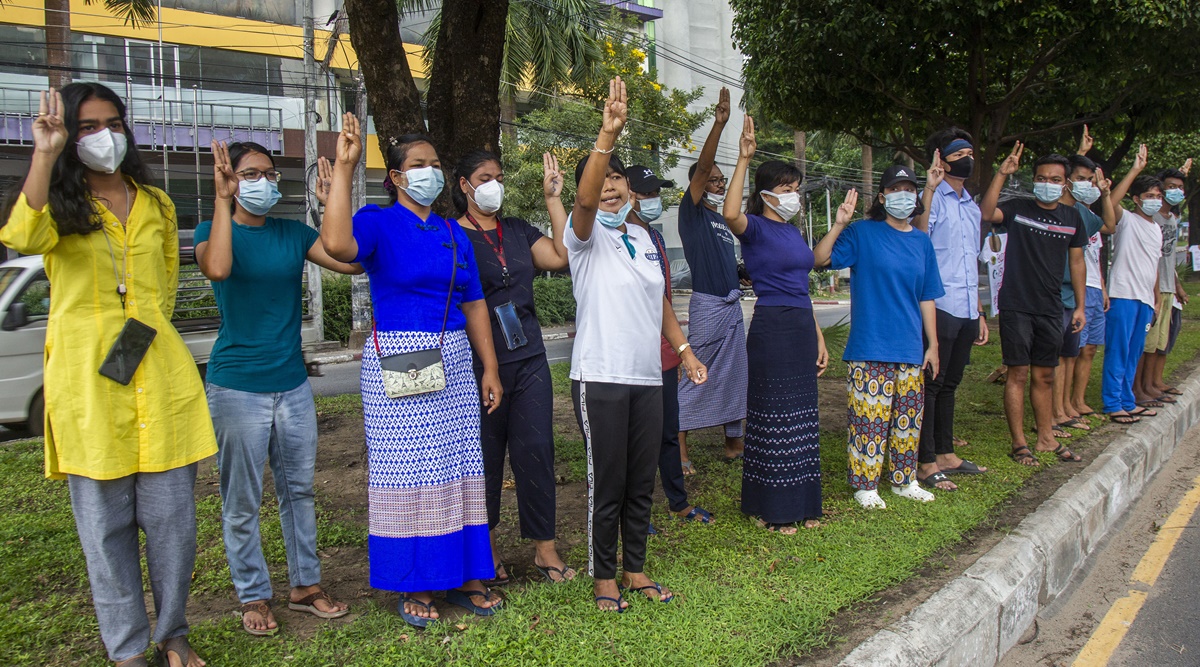“They fled the country of their origin under imminent threat to their lives and liberty. In such a situation, insisting that they first answer for admitted violations of our domestic laws...would be palpably inhuman,” the bench observed.
 Anti-coup protesters flash the three-finger salute during a demonstration at Yangon, Myanmar, in April. (Photo: AP)
Anti-coup protesters flash the three-finger salute during a demonstration at Yangon, Myanmar, in April. (Photo: AP)
“They fled the country of their origin under imminent threat to their lives and liberty. In such a situation, insisting that they first answer for admitted violations of our domestic laws…would be palpably inhuman,” the bench observed.The High Court of Manipur on Monday ordered safe passage to seven Myanmar nationals, stranded at a border town in Manipur, to travel to the United Nations High Commissioner for Refugees (UNHCR) in New Delhi.
It is learnt that three of the seven Myanmar nationals are journalists working with Mizzima News, while the rest are their kin.
The order was issued by a division bench comprising Chief Justice Sanjaykumar and Justice Lanusungkum Jamir, in response to a petition filed by one Nandia Haksar. The petitioner approached the court to pass an order for safe passage to the seven Myanmar nationals to seek protection from UNHCR.
In the course of the hearing, the bench noted that though India has no clear refugee protection policy or framework, it does grant asylum to a large number of refugees from the neighbouring country. It further noted that India usually respects UNHCR’s recognition of the status of such asylum seekers, mainly from Afghanistan and Myanmar.
Citing this, the court observed that the seven in question are not ‘migrants’, as normally understood, but are ‘asylum seekers’.
“They did not enter our country with the clear-cut and deliberate intention of breaking and violating our domestic laws. They fled the country of their origin under imminent threat to their lives and liberty. They aspire for relief under International Conventions that were put in place to offer protection and rehabilitation to refugees/asylum seekers. In such a situation, insisting that they first answer for admitted violations of our domestic laws, as a condition precedent for seeking ‘refugee’ status, would be palpably inhuman,” the bench observed.
In his argument, S Suresh, Assistant Solicitor General, cited the provisions of the Foreigners Act, 1946; the Foreigners Order, 1948; and the Registration of Foreigners Act, 1939; in support of his contention that these seven persons, who admittedly entered the country illegally, should first face the consequences of their unlawful acts.
The counsel further asserted that the Constitutional freedoms available under Article 19 are limited to citizens and these seven persons cannot claim such freedoms under Articles 19(1)(d) and 19 (1)(e), with regard to moving freely or residing/settling in any part of the territory of India.
The petitioner, on the other hand, stated that after a military coup in the neighbouring country in February, the military junta banned Mizzima news and arrested several journalists. As such, the journalists, with their family, fled their country. They entered India and have taken shelter at Moreh border in Tengnoupal district of Manipur.
The petitioner maintained that the Myanmar nationals feared they would be sent back by the Assam Rifles, as they had come without proper travel documents.
Earlier in March, the Ministry of Home Affairs had directed the authorities of the border states in the North-East and the Assam Rifles to check the flow of illegal migrants from Myanmar in the wake of the coup.






